
| 
| 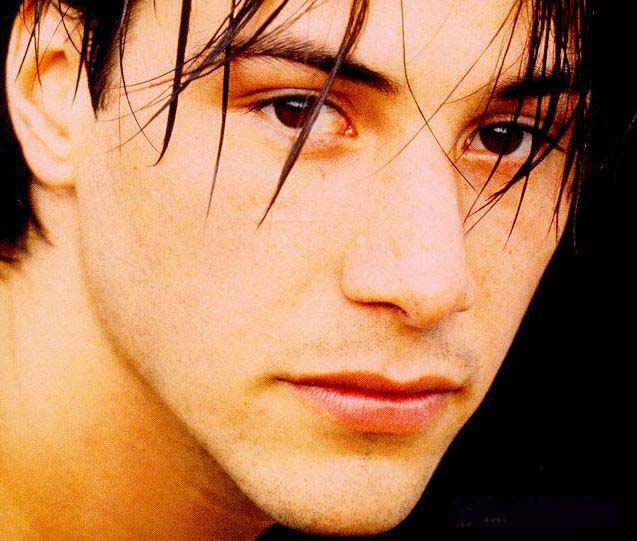
CLICK ON THE PICTURE TO GO TO 'THE KEANU REEVES WEBSITE'
Keanu Charles Reeves was born September 2, 1964 in Beirut, Lebanon, to Samuel Nowlin Reeves (half-Hawaiian, half-Chinese) and Patric Taylor (English). There was a move to Australia for a year where his first sister Kim was born in 1966. A second (half) sister, Karina, was born in 1976. Keanu (Key-ah-nu) means "cool breeze over the mountains" in Hawaiian (For those who wish to get technical, the translation is relative. Hawaiian is actually a picture language, and in many cases deals with concepts or ideas more than just specific words. "Keanu" -- what a concept!)
After their divorce, Patric and Samuel went their separate ways: Patric and the two kids to New York City, and Samuel to Hawaii. Keanu visited his father in Hawaii on occasion until he was thirteen. That was the last time Keanu saw him. Samuel was sentenced in 1994 to ten years in prison for drug possession. He was paroled in mid-1996. They do not maintain contact with each other.
In New York, Patric met and married director Paul Aaron. They moved to Toronto, and took up Canadian citizenship (which Keanu still retains), but split up less than a year later.
Keanu described himself as a "middle-class white boy. A bourgeois, middle-class white boy with an absent father, a strong-willed mother, and two beautiful younger sisters."
Patric switched partners a few times more and moved as often. Her third husband was rock promoter Robert Miller (with whom she had Karina), and her fourth was Jack Bond, whom she divorced in 1994.
Keanu attended Jesse Ketchum Public School in Toronto from kindergarten through the eighth grade, and attended four high schools (including De La Salle College and the Toronto School for the Performing Arts) before dropping out completely at age 17.
Keanu took on lots of different jobs, including sharpening skates at an ice rink shop (he's an avid hockey player), landscaping, and making pasta (and managing the place to boot!). Then came some stage work (most notably - and notoriously - Wolfboy in 1984, his professional stage debut) and some bit parts on TV. His motion picture debut was in Dream To Believe in Canada but it [reportedly] was the 1986 TV movie Under the Influence that earned him his SAG union card.
Keanu's first big feature film debut in a US film was in Youngblood in which he had a small part.
Keanu hit the road for Hollywood in 1986 with $3,000, an old Volvo, and his stepfather Paul Aaron's address. A few name changes followed as "Keanu" was considered by his manager to be too exotic. They settled on K.C. Reeves, but it was short-lived. Keanu it was, and Keanu it was going to be.
Keanu soon landed River's Edge, arguably one of his best roles ever. A string of movies followed (see CREDITS) as the troubled (or misfit) teen. His parts continued to grow, and then he started attracting the eye of more mainstream directors. He landed films like Dangerous Liaisons, Bram Stoker's Dracula, Much Ado About Nothing, and Little Buddha.
But it was 1994's Speed that really made everyone stand up and notice. Perhaps not so much for Keanu's acting, but the fact that this was his first mega-hit, grossing nearly $300 million at the box office (world-wide). Figures like that will catch the eye of any studio executive, and Keanu was soon reportedly being offered sums up to $7 million for his services.
With Johnny Mnemonic and A Walk in the Clouds already in the can, those offers were put on hold or turned down so that Keanu could return to Canada and fulfill a dream of playing the title role in Hamlet on stage. Reviews were mixed, but in general reviewers were kind and some were enthusiastic.
More films followed: Feeling Minnesota, Chain Reaction and The Last Time I Committed Suicide, which did moderately at the box office.
Keanu was then offered the lead in the sequel to Speed, entitled Speed II. But he felt the script was not good and he turned it down. Everyone accused Keanu of making a horrible mistake; and that he should have done the role. 20th Century Fox, not wishing to disclose the real reason Keanu turned it down (bad script), gave out a press release saying that Keanu turned it down so he could tour with his band, Dogstar. In fact, that was not true. Keanu was offered a better script (Devil's Advocate) and he filmed that at the same time as the disastrous Speed II was filmed. Devil's Advocate was a big hit and Speed II sunk at the box office. Suddenly critics were saying how smart Keanu was for turning down Speed II.
The it was off to Australia to film The Matrix. No one knew what to expect from this, and when it opened in the spring of 1999 it was a huge blockbuster, and brought Keanu back front and center in the public eye and catapulted him into the top ranks of money earners with an asking salary of $20 million per picture. In the summer of 1999 Keanu filmed The Replacements, and finished out the year with The Watcher. Both of those pictures were released in the year 2000.
In 2000, Keanu went on to film three more films, The Gift, Sweet November, and Hardball.
There are many more projects lining up for Keanu's attention, not the least of which is a commitment to do two sequels to The Matrix, tentatively scheduled to shoot back-to-back in the spring, summer and fall of 2001 for release in 2003
(Source : The Keanu Reeves Website)
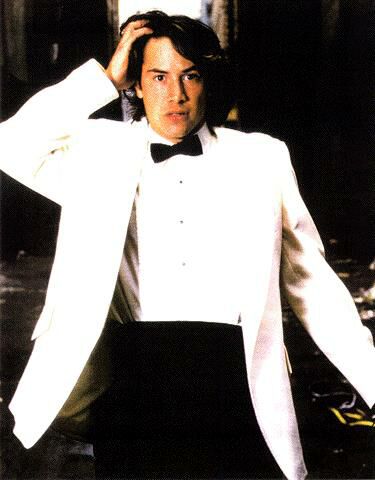
BIOGRAPHY
(Source : http://mrshowbiz.go.com)
Occupation: Actor
Real Name: Keanu Reeves
Date of Birth: September 2, 1964
Place of Birth: Beirut, Lebanon
Sign: Virgo
Relations: Mother: Patricia (costume designer); father: Samuel Nowlin Reeves (geologist); stepfathers:Paul Aaron (theater director), Robert Miller (promoter), Jack Bond (hair salon owner); siblings: Kim (horse breeder), Karina; ex-girlfriend: Jennifer Syme; companion: Amanda de Cadenet
Education: High school dropout
I DO know that I am the critics' whipping boy." This assertion from the mouth of Keanu Reeves is rare by virtue of the fact that it is indeed an actual assertion. The actor has frustrated countless interviewers with his noncommittal verbiage, and breakthrough statements like that one have been few and far between. If asked to relate his acting philosophy, Reeves will characteristically respond, "I don't know anything, man." If he catches himself trying to explain something, anything, he will dismiss what he has said with "I don't know what I'm saying." Many critics would claim that Reeves' inability to communicate his thoughts and emotions in interviews emerges just as strongly in his acting style. But to his credit, in his eleven-year film career, Reeves has deadpanned his way to being one of the highest-paid actors of his generation.
Reeves' mother, Patricia, really got around and she dragged her kids along for the ride. Keanu was born in Beirut, Lebanon, when the city was still known more for its beaches than for its bombs. Patricia met Samuel Nowlin Reeves while working as a showgirl at a local club. Their marriage didn't last long, and Patricia packed up Keanu and his little sister, Kim, and relocated to New York City, where she married Paul Aaron, a Broadway and Hollywood director. The Aarons toted the kids up to the more family-friendly Toronto, but split up a year later. There would be two more husbands one a rock-and-roll promoter, and the other a hair salon owner. Little Keanu seemed to take it all with a laid-back smile; his rotating dads provided such diverse experiences as wrestling with rocker Alice Cooper and being shuttled off to Jewish summer camp. Samuel Nowlin Reeves lost contact with his son when Keanu was still a child, and he is currently serving a prison sentence for cocaine possession.
Reeves never took to academics: "He wasn't quite, well . . . with it," a former teacher of Reeves has said. "He always left his books at home or forgot his homework. But he'd just smile and go back home to get them." Hockey and theatre were more to Reeves' liking: often he would mix the two by reciting Shakespeare while tending goal. After bouncing around to several different high schools, Reeves dropped out to pursue acting full-time. He first caused a stir in Toronto with a role in the homoerotic play Wolfboy; he also acted in several Canadian teleplays. When Rob Lowe came to town to film his hockey drama Youngblood, Reeves won a bit part hockey and drama, all in one opportunity! Reeves then decided to make the long haul from Toronto to Los Angeles in pursuit of his dream or whatever.
Once in Hollywood, Reeves caught the attention of directors and critics for his performance as a disaffected teenager in River's Edge (1986). The following year, he confounded everyone's expectations of him by rocketing to stardom with Bill & Ted's Excellent Adventure, while, at the same time, holding his own in the ensemble period drama Dangerous Liaisons. The critics had a conundrum on their hands: was Reeves a gifted actor, or simply a lucky moron? Most supported the latter theory. But no one was in denial about one thing: he was steadily building a career as a bankable leading man. Reeves has worked with some of the most celebrated directors of our time Bertolucci (Little Buddha), Coppola (Bram Stoker's Dracula), and Van Sant (My Own Private Idaho); and despite almost continual verbal drubbings at the hands of critics, directors continue clamoring to work with him. Reeves certainly proved his drawing potential with Speed, which racked up $121 million at the box office.
Reeves' private life hasn't proven all that interesting to speculate about, so rumors occasionally seep in to fill the void. For one thing, his sexual orientation is often questioned (one persistent rumor had him married to entertainment mogul David Geffen), and the laconic Reeves doesn't do much to quell the whispers. He will say he is not gay, then coyly add, "But ya' never know . . . " He lives in hotels, rides a motorcycle, and often flies the members of his band, Dogstar, to rehearse with him while he is on location. He cited commitments with the band as one of the reasons he turned down nearly $12 million for the critically lambasted Speed 2.
He also passed on the chance to work with Al Pacino and Robert De Niro in Heat so that he could play Hamlet in Winnipeg. That's right, Winnipeg. His 1996 actioner Chain Reaction disappointed across the board, but his performance in the coal-black comedy Feeling Minnesota restored his fans' faith. He finally took his chance to work opposite Pacino, in the 1997 thriller Devil's Advocate, in which he played a bright, young lawyer to Pacino's devilish senior partner. Though Reeves had bad luck with the better-left-forgotten sci-fi bomb Johnny Mnemonic (1995), the 1999 Warner Bros. flick The Matrix, in which he portrayed a man who leads a society in a revolt against the computers that enslave it, catapulted him back to the A-list for the first time since Speed. While Keanu cashed in from the mega-hit, and its two upcoming sequels, he still found time for movies that didn't feature slo-mo bullet-dodging. His post- (or between) Matrix roles included an overworked businessman who falls in love with a mystery woman in Sweet November, a serial killer in The Watcher, and a convincingly scary wife beater in The Gift, which earned him some of the best notices of his career. Although Keanu as a scab quarterback who leads a ragtag team to gridiron glory in the 2000 release The Replacements didn't light up the box office, he was back in sports mode for Hardball as a compulsive gambler foced to coach a Chicago inner-city little league team.
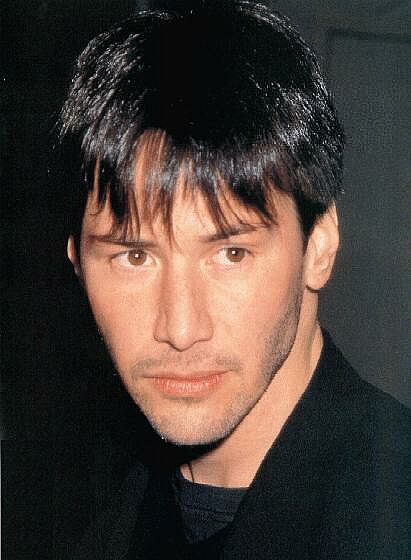
Interview
(Source : http://actiondventure.about.com)
Keanu Reeves' Excellent Interview - The Gift, Bill and Ted, and Matrix 2
Dateline:1/30/01
All-around good guy Keanu Reeves plays his second bad guy character in a row in The Gift. First was his stalker villain in The Watcher, and now he plays a wife-abusing suspect in a supernatural murder mystery. I had a chance to talk with Reeves about this latest role, and slip in a few questions about the classics.
Was it your idea to have a beard in The Gift? I don't quite know how that happened, but it did. I think the genesis of it was I had a beard when I came to see [director] Sam [Raimi] one time and he liked it. One of the things that Sam Raimi wanted me to do was to kind of be more unrecognizable in what he thought classically I would be recognized as. So, I think that's where the beard kind of became "Don't shave."
Is it true director Sam Raimi didn't originally want you to read for this part? What I know is that one of the producers had the idea for me as the part and then went to my agents and then I got the script and read it and then they told the idea to Sam and Sam was like, "Uh, okay. I'll take the meeting." And then I came to him and I remember going to their office and just speaking about the part, telling him what I thought and then it came back to me that he was interested in me playing the part. I wasn't conscious of his reticence when I first met him. I didn't know that he was taking a meeting and I found out quickly. When I was speaking to him, he said to me, "What did they tell you when you came here?" I went, "Oh, I'm auditioning." So I auditioned basically.
What appeals to you about this dark character? I haven't had the chance to really play a part like that, to play a wife beater. I found the character very dynamic. I always felt that the character, though damaged, had a sincerity to him and an emotional vulnerability to him. I think that's the base of what he is. He's damaged because of suffering something as a kid or not being able to extricate himself from that consciousness. I think in the courtroom, he gets a chance. "I swore I'd tell the truth. Yeah, I'm a wife beater. Yeah, I do that."
Do you use accents like this or The Devil's Advocate to defy perceptions? I can't say I don't act to change perception, but it's not a reaction after someone's had a perception. To have an accent is to play a part. For me, that's what's exciting about acting. For me putting on an accent is like any physical gesture or psychological gesture. You have to find it to find the character. It's a way into the character. I'll say yes that part of the attraction for me is to be able to play a different kind of part. That's where it starts. Hopefully if I do that, then the aspects of changing perceptions will allow me then to play other parts.
Are you concerned The Matrix will create another typecast like the Bill and Ted movies? I don't really worry about Bill and Ted anymore, or Neo. I'm always surprised when people forget that you're an actor. I don't want to get pigeonholed, but I think for The Matrix my character doesn't carry that film. It's not like Mel Gibson in Lethal Weapon, the character who carries the film. I don't really have that concern, but I do want to do different things.
Do you mind the Bill and Ted legacy? I love it.
Any talk of a third? I always told Alex Winter, who played Bill, that we should do it when we're 40. So, I think when we turn 40 we'll approach it. Just like fat, Vegas boozers. The babes have left us.
How about an audio commentary for the DVD? Dude, we're totally in a movie!
How are the Matrix 2 preparations going? Uh, they're fine.
Can you tell us anything about the training your doing? It's harder and more sophisticated. Instead of one-on-one fights, there's multi-fights and weapons, in addition to what Larry and Andy Wachowski want to do, where they want to put the camera and the environments they want to shoot in.
Can this sequel possibly live up to expectations? The brothers have a tough gig ahead of them, which is very daunting, but which is good. It helps you do better work, sometimes. I thought they made a great film and there's such a nice vitality to the film if you relate to the picture. A lot of people don't like it, but if you do respond to it, there's a freshness and vitality to it and excitement.
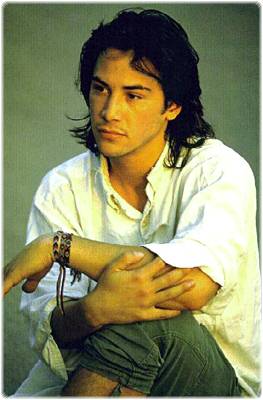
Interview
(Source : www.eonline.com)
On being Beat, ignoring critics, playing in a band--and looking for work
by Ken Neville
If it's all the same to you, Keanu Reeves would just as soon take the bus.
And not the runaway, bomb-laden RTD vehicle favored by Reeves' Jack Traven during the wild thrill ride of Speed. No, these days, the 33-year-old Toronto native prefers the slower and safer--though not necessarily saner--tour bus used by his band, Dogstar, for their series of summer dates.
Reeves, you see, doesn't want to be just another Hollywood action hero. That's one of the reasons he passed on Speed 2. And it's a big reason why, this summer, he's in the microbudgeted The Last Time I Committed Suicide, a story based on Beat hero Neal Cassady. Reeves doesn't even play the lead; his character is merely Cassady's drinking buddy.
And that's just fine with Keanu. Playing a sideman, whether in a small independent film or as a bass player in a three-piece alternative rock band, gives Reeves a chance to step outside the often harsh glare of the spotlight for a while.
Of course, he has always been attracted to riskier, offbeat fare, even though he's starred in big-budget action flicks like Chain Reaction and Johnny Mnemonic--and can be seen this fall opposite Al Pacino in Devil's Advocate.
In person, Reeves is friendly, gracious and surprisingly frank about both himself and Hollywood. And if you need it, he might even have exact change for the bus.
You make a lot of action movies, but you've also made a lot of very smart films, like Much Ado About Nothing, Dangerous Liaisons, Parenthood--
Yeah. Directed by Ron Howard. Good characters. That was one of his last really good pictures.
So, having done these good films, how do you deal with the things people say about some of your other work?
Alka-Seltzer. [Laughs.] You know, some people like what I do, some don't. There's not really much I can do about it. I'm trying, you know? I'm not the best actor in the world; I know that. But I'm trying. That doesn't mean anything, I guess--just to try.
Do the critics bother you?
It's like they have a separate rating--the Reevesian view. "Okay, here's this Reeves guy again. What can we say about him now?"
Maybe part of that comes from Bill and Ted's Excellent Adventure.
A beautiful film. Well written. Really great spirit.
Still, it's the sort of thing that gives your critics ammunition. What film would you point to and say, "Yeah, but..."?
I'd start with Little Buddha, then go to Feeling Minnesota and maybe My Own Private Idaho--in terms of going off of that color. And Aunt Julia and the Scriptwriter, even.
The novel that became Tune in Tomorrow with Barbara Hershey?
And Peter Falk. I loved that movie. I thought that was a really good film. And it showed a relationship between a man and a woman you don't often see--people who enjoy each other's company but who also want to fuck.
Is it odd seeing all the hype about Speed 2? After all, it was your magic with Sandra Bullock that created that franchise.
Yeah, she's great. It's not odd at all. I expect Jason Patric will be good in it.
Do you know him?
Not at all. I've seen his work. I find him to be a very interesting actor. His reticence will hopefully translate well to the piece. They hired me to do it; they can hire someone else to do it. That's the business.
On the subject of business, there are so many big-budget movies around right now.
Yeah, this year, Fox alone has Titanic and Speed 2, with combined budgets of $350 million. Talk about sink or swim. There's not going to be as many movies made next year. There's such a glut in the market, there's no time for a film to be in theaters.
So, here you are with a $1 million film.
I think they've really picked a good time to bring this out--in the summer against Batman. [Laughs.] Stephen Kay [the director] and I both feel it should have come out in the fall, that it's a real fall picture. Know what I mean? It's 50 degrees in New York, you want to go see a picture. The Last Time I Committed Suicide, Neal Cassady...why not?
And it's not a leading role. That's a departure.
I loved it. When you're not playing the hero in a piece, you don't have such a linear obligation. You generally get to do more stuff--stuff being character things. Actors always look to play the villain, because there's more to do.
How did you get involved with this project?
I knew Stephen. He had written this script about Neal Cassady. I told him I dug it. "I dug it, brother"--one of the most fun things about the piece was calling everybody "brother." I love that fraternity. "Hey, brother." "Hey, brother, man."--and a couple of months down the road, Stephen asked if I was interested in playing Harry. I'm not an obvious choice for Harry. I said, "Shouldn't you get Steve Buscemi?" And he said, "We'll put a mask on you."
Have you always been a Neal Cassady fan?
Yeah. When I was in my late teens, I was reading On the Road, Dharma Bums and getting into Ginsberg. I guess I really connected with the spirit of this character--his restlessness, his search, his joie de vivre.
To me, these writers represented the epic language they used invoking the Greek and Roman gods. That Bacchus and Dionysian aspect resonated with me, and I used that to try and read my life and break out of myself, search for new sensations--living the moment, staying up late, traveling, experiencing. But also I've always found it sort of melancholy on the road; there's a sadness to it.
Searching for something, but not necessarily finding it?
Right.
And this was prior to coming to Hollywood?
Well, yeah. But I'm still doing it. Now, I'm a little older, so I have to pick my times. Cassady was the guy these writers focused on and used in their lives and writing for their own explosions.
And Last Time chronicles that?
Yeah, it depicts a real human state--that torment between being committed to a relationship and then always wanting to have the escape hatch. And I think Thomas Jane [the actor who plays Cassady] did a remarkable job of showing those jitters.
There's a moment where he and his girl begin to talk about the future, and he says, "I've got to get my suit. I can't go to that job interview looking like this. I've got to get the suit." It's that thing--"I've got to go out. I've got to go." And he leaves her. It's tragic. I saw the film with some girls, and it made them so sad, because they've experienced that with men--being there, trying to commit, that rush of love. Everything's there and all-consuming, and then--where did it go?
And as Cassady's lover, Clare Forlani plays right into that.
What's cool about her character is she has her own demons. It's not just this woman who's looking at Neal. She's slitting her wrists. Neal has to take care of her. It's not just about him, and he knows it.
These are really relevant themes--things everybody has to look into: responsibility, commitment and your own desire to run away from all of it and be a free agent. You have those battles every day, and I think that's what the film is about. He leaves her [dying in the hospital]. And she lives. Imagine what that felt like.
Is there a side to you that wants to live the settled-down, white-picket-fence, happily-ever-after life?
I went through a phase last year, but I'm over it.
That was quick.
Yeah. I'm sure it's something that'll keep coming around, but I'm kind of over it right now.
So, when you just need to escape, where do you go?
Sometimes, I just sit on my couch and think or read or play chess. I get to do it a little bit with the band I play in. We've been on the road for the past couple of summers. That's really doing it--going on the road, playing music, drinking, going out for laughs.
And you're doing it again this summer?
Yeah, in a bus. We're going to sell our record at the shows. I think we're doing 50 shows in 65 days.
And you'll write the Kerouac-esque story of it all--On the Road with Dogstar?
I don't know what I'm going to do. Right now, I'm thinking I'm going to work on my chess and maybe my Shakespeare a little bit. Last year, I brought all these books, and I maybe read a page. Other than that, I just kind of sat and drank and talked and played bass.
And when the tour's over, you've got another movie opening.
Yeah, Devil's Advocate this fall with Al Pacino. He's the best. He's the man.
And Charlize Theron?
Oooh. She's incredible--a movie star.
What else is going on?
I'm looking for a job.
Anything happening romantically?
No, nothing going on there. I'm looking for work and looking for love, hopefully not in all the wrong places.
I'll put the word out.
Thanks.
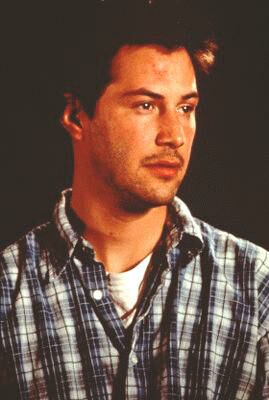 | 
| 
|


